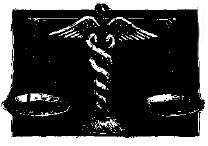Student Notebook
Lawyers-turned-doctors
By Peter Frech, Sharon Johnston, and Paul Testa
The first thing we must do is kill all the lawyers," said Dick the Butcher in Shakespeare's Henry VI. Contrary to the popular belief of many a medical school professor, that proposal was not intended to better society. Rather, Dick the Butcher was suggesting a way to eliminate those who might stand in the way of the coup that he and his henchmen were planning. Nevertheless, the stage was set for several hundred years of lawyer jokes.
But it's no joke that a few lawyers—as well as doctors— have decided to become physician- lawyers. Who else is better suited to unraveling the complexities of a health-care system that involves the government, managed care companies, and the courtroom? Still, many people are surprised that lawyers are willing to take on the demands of a medical education.
Take our classmates' reactions when they found out that we were attorneys. Invariably, their facial expressions reflected disbelief and curiosity, and they did a quick eyeball assessment to confirm our sanity. The most common question was "Why take on med school when you've already completed the rigorous training to become an attorney?" To our classmates' credit, they listened to our explanations with interest, caring, and quiet understanding.
Universality: It wasn't long, however, before they began to realize that we had entered medicine for the same reasons they had: We were drawn to the profession of healing because we want to help people and we are fascinated by the universality of scientific truth.
As our classes got under way, we noticed some similarities between law school and medical school. In law school, we had grown accustomed to spending long hours analyzing legal cases and judicial precedents. In medical school, we were spending long hours poring over anatomy texts, peering at histology slides, and examining cadavers. In law school, we had learned how essential it was to be organized and to thoroughly understand cases in preparation for a trial. In medical school, we were expected to have a thorough understanding of a patient's condition before presenting the case to the attending physician on morning rounds. And being able to communicate effectively is crucial in both law and medicine.
There have been differences, too; our legal training had prepared us for only some of the rigors of medical school. Learning law means becoming familiar with a set of rules that are driven by principles of equity and fairness. If you are taking a test and don't know the pertinent law, you can usually use intuitive reasoning to figure it out. Medicine, however, requires far more memorization. Intuitive reasoning most certainly has its place in medicine, but it is a field premised much more on hard data than is the law.
We have also been amused and surprised by others' perceptions of lawyers. Sure, we've heard, chuckled at, and told our share of lawyer jokes. But every so often something unexpected happens—like the professor who interrupted while one of us was introducing himself to the class: "You're the attorney," he said. "You can sit down. We don't need to hear any more from you."

|
|
The ensuing conversations are often stimulating and show
how dependent medicine and law are on one another. |
Perspective: Most clinical faculty, however, have been eager to have us to share our unique perspective. We not only can raise legal issues, but we can share our perspectives from having worked with clients, delivered bad news, and managed our own trials. Faculty and our fellow students have listened when we explained the nuances of informed consent, power of attorney, competency, and patient confidentiality. Classmates have turned to us with fascinating legal questions drawn from hypothetical situations that we could well encounter as doctors. Although there may be no "right answers" to the questions that they raise, the ensuing conversations are often stimulating and help to show how dependent medicine and law are on one another.
There is great value in exploring the relationship between our systems of law and of health care. Doctors, nurses, and other health-care providers are advocates for their patients. What we share as attorneys and hope to bring with us as physicians is an understanding of how advocacy effects change. As a society, we choose to control much of the provision of health care through the legal system. As doctors first, and attorneys second, perhaps we can find a way to contribute to the ongoing dialogue about what health care is to become in the future.
Dynamic dialogue: The three of us came to medical school to become physicians and to care for patients. We also hope to use our legal knowledge to benefit the medical community. We have seen firsthand that at Dartmouth, there is a dynamic dialogue flowing among doctors, medical students, patients, and their families and that there is a commitment to crafting patient-centered outcomes—a model that the law has used for generations.
Perhaps one day, physician-lawyers like us will make it easier for attorneys and doctors to work together more effectively as they deal with the constantly changing field of health care.
"Student Notebook" (formerly titled "Student Perspective") shares word of the activities or opinions of students and trainees. All three authors of this essay were lawyers before they entered medical school. Frech, a DMS '02, went to law school in Seattle, worked there as a criminal prosecutor, and then had his own practice in northern Washington. Johnston, an '03, received her legal education in England and worked as a clerk for a Canadian judge. And Testa, an '04, attended law school in Boston and worked as a health-care and litigation associate in corporate law firms in New York City and Boston.
